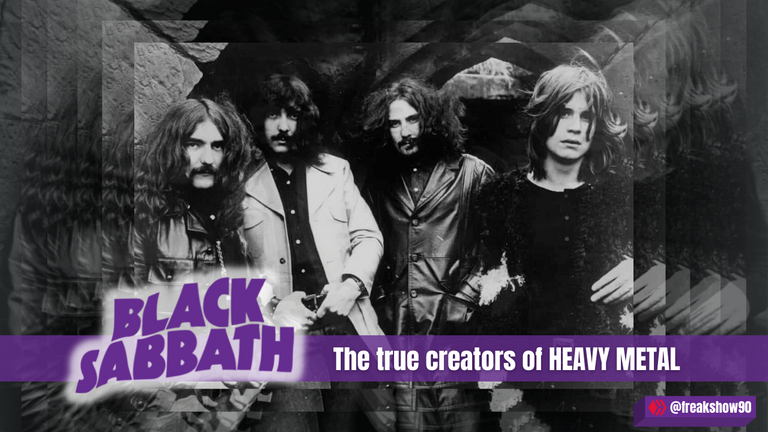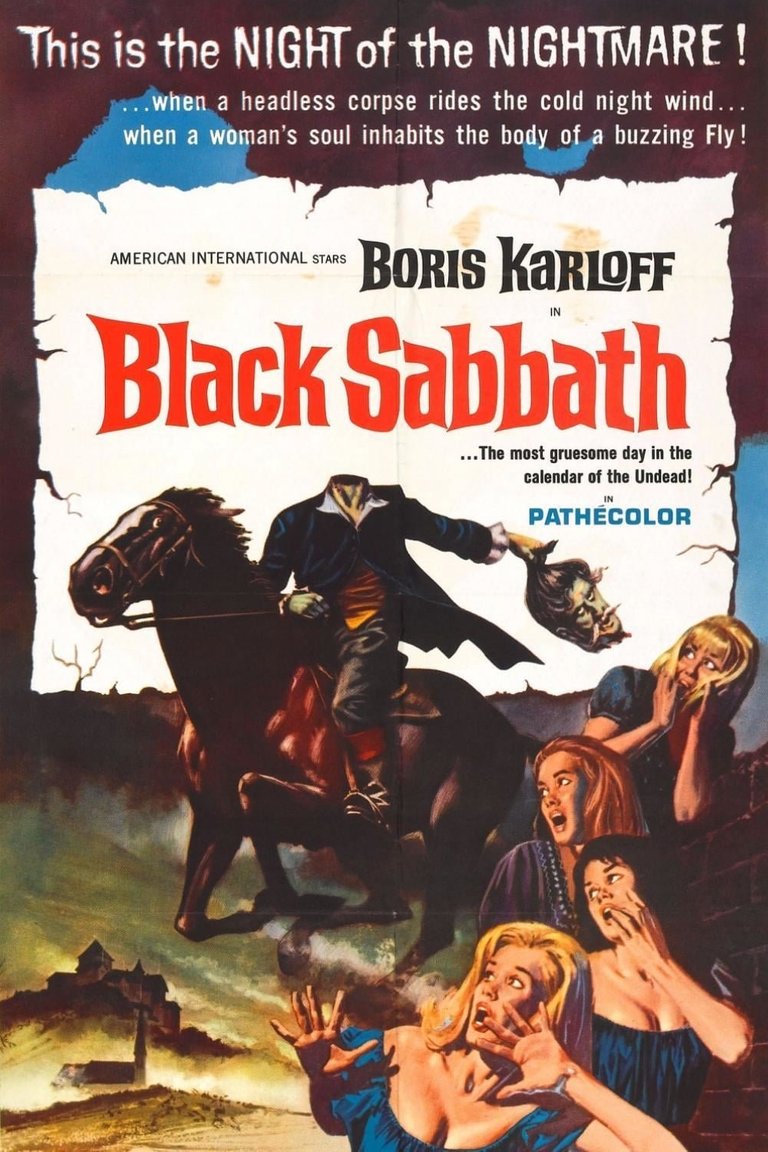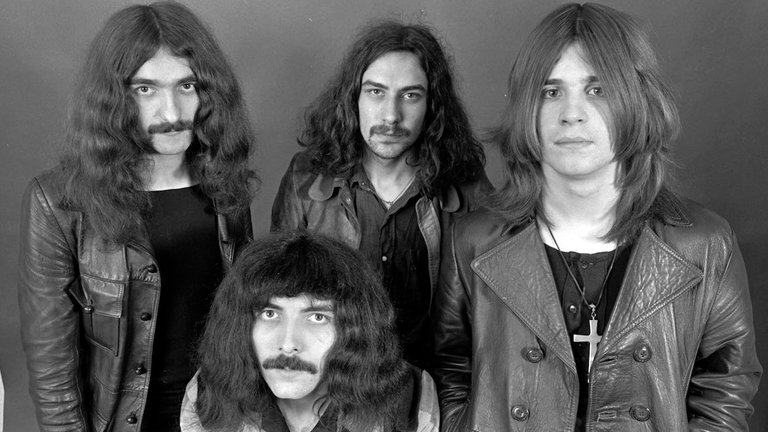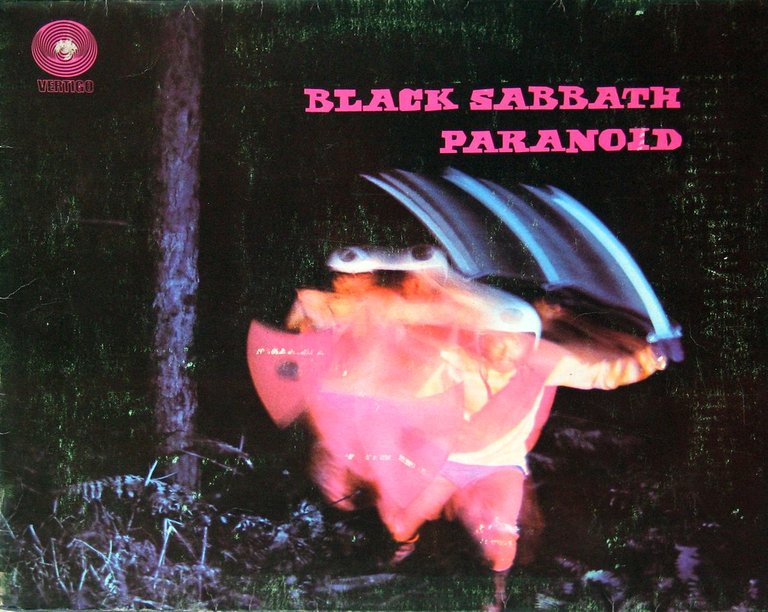
There are people who think, claim and attest that Black Sabbath was a "good band" but nothing more than that. They attribute the level of greatness or legends in Heavy Metal to Judas Priest, Ronnie James Dio (with Rainbow, mainly), and even Led Zeppelin or Deep Purple, as the genuine creators of this so characteristic and majestic sound of rock and roll. However, I am not among those people. For me, the real geniuses behind the stridency of this sub-genre are the boys from Birmingham, England. You know, Ozzy Osbourne, Tony Iommi, Bill Ward and Geezer Butler. Surely, a totally unnoticed "unknown" (please note the big sarcastic tone).
And the fact is, what is in the title of this post is totally the essence of what you are reading. It is always important to give importance, in its right measure, to those who really deserve it. These guys, from the well-known steel and industrial (railway) city of England, are in every law the true makers of a sound that simply didn't exist in the late 60's of the last century. What's more, although Deep Purple's greatness is unquestionable, it is no less true that they (as a band) never defined themselves as a purely "heavy" group. It is not wrong to assert that the category of "progressive rock" is supremely more accurate than the dark, distorted, powerful, wild and mystical atmosphere that "Sabbath" had; especially on their first four studio albums.
Now, how did this whole dispute/pollution come about; and more importantly, why is it important? Simply because human beings love to (obsessively) categorise everything. Music itself is a democratic compendium of influences. In other words, one style ends up influencing another, and so a completely new one emerges. Which in turn wouldn't exist in the first place if it hadn't been preceded by another. And so on... If you look closely, when it comes to the history of rock and roll, it has always been important to come first. The Rock and Roll Hall of Fame awards themselves are a kind of "Cooperstown" for the immortality of the bands, artists, songwriters, producers and musicians in general who have been able to get in. But they are by no means a reliable measure of the real extent of what those bands did for the people who listened to their creations.
Hay personas que piensan, aseguran y dan fe, acerca de que Black Sabbath fue una "buena banda" pero nada más que éso. Le atribuyen, el nivel de grandeza o de leyendas, en el ámbito del Heavy Metal, a Judas Priest, Ronnie James Dio (con Rainbow, principalmente), e incluso a Led Zeppelin o Deep Purple, como los genuinos creadores de este sonido tan característico y majestuoso del rock and roll. Sin embargo, yo no estoy dentro de aquéllas personas. Para mí, los auténticos genios detrás de la estridencia propia de ese subgénero, son los chicos de Birmingham, Inglaterra. Ya saben, unos tales: Ozzy Osbourne, Tony Iommi, Bill Ward y Geezer Butler. Seguramente, unos "desconocidos", totalmente desapercibidos. (Por favor, nótese el gran tono sarcástico).
Y es que, ésto que está en el título de este post es totalmente la esencia de lo que estás leyendo. Siempre es importante darle la importancia, en su justa medida, a quienes realmente son merecedores de ella. Estos muchachos, de la conocida ciudad acerera e industrial (ferroviaria) de Inglaterra, son en toda ley los verdaderos hacedores de un sonido que sencillamente no existía a finales de los años 60's del siglo pasado. Es más, si bien la grandeza de Deep Purple es incuestionable, no menos cierto es que jamás se definieron (ellos como banda) como una agrupación netamente "heavy". No es caer en un error afirmar que la categoría de "rock progresivo" es supremamente más acertada, que la oscura, distorsionada, poderosa, salvaje y mística atmósfera que tuvo "Sabbath"; especialmente en sus primeros cuatro álbumes de estudio.
Ahora bien, ¿cómo surgió toda esta disputa/polémica; y más importante aún, por qué es importante? Sencillamente, porque a los seres humanos les encanta (obsesivamente) categorizar todo. En sí, la música es un compendio democrático de influencias. Dicho de otro modo, un estilo termina influyendo en otro, y así surge uno completamente nuevo. Que a su vez no existiría en primer lugar, de no ser porque antes le antecedió otro. Y así... Si se fijan bien, en el aspecto relacionado con la historia del rock and roll, siempre ha importado llegar primero. Los mismísimos premios al "Salón de la Fama del Rock and Roll" son una especie de "Cooperstown" para la inmortalidad de las bandas, artistas, compositores, productores y músicos en general que han podido ingresar allí. Pero para nada son una medida fidedigna del alcance real de lo que esas bandas hicieron con las personas que escucharon sus creaciones.

To exemplify it well, Metallica, Skid Row, Guns and Roses, even Alice Cooper himself, have never been able to deny that part of their inspirations came from the spell, the mystique and the musical composition created by Black Sabbath. Put more simply, they have openly declared themselves fans of the Birmingham boys. And this is extremely relevant, because they as artists did not end up copying what inspired them, but created their own sound, ambience, atmosphere, mystique, and everything else, despite the deep admiration they felt for our protagonists of today's post.
In this sense, whoever loves music, but especially this precious musical genre (rock and roll) never stops to think: "Hey, who must have been the first of the first, who stood out with a 2-minute guitar solo? Knowing this is important, but not defining. It serves for historiographical and statistical purposes but not as "common currency" among the various people who love and will continue to love these irreplaceable musicians.
Para ejemplificarlo bien, Metallica, Skid Row, Guns and Roses, incluso el propio Alice Cooper, jamás han podido negar que parte de sus inspiraciones pasaron por el hechizo, la mística y la composición musical creada por Black Sabbath. Dicho de un modo más simple, se han declarado abiertamente fanáticos de los chicos de Birmingham. Y ésto es sumamente relevante, porque ellos como artistas no terminaron haciendo una copia de lo que les inspiró, sino que crearon su propio sonido, ambiente, atmósfera, mística, y todo lo demás, a pesar de la profunda admiración que sentían por nuestros protagonistas del post de hoy.
En este sentido, quien ama la música, pero sobre todo este precioso género musical (el rock and roll) jamás se detiene a pensar: "Oye, ¿quién habrá sido el primero de los primeros, que se destacó con un solo de guitarra de 2 minutos?". Saberlo es importante, pero no definitorio. Sirve para propósitos de historiografía y estadística pero no como "moneda de uso común" entre las diversas personas que aman y seguirán amando a éstos músicos irremplazables.

Besides, if we stick to the human quality of putting everything in strict chronological order, The Beatles' "Helter Skelter" was composed, assembled and released in 1968. But no one could ever claim that the Fab Four were the forerunners of that sound so full of power, evil and darkness, could they? Added to this, Ozzy Osbourne, as well as Bill Ward (vocalist and drummer, respectively) always declared themselves absolute fans of the boys from Liverpool. Once again proving my point: music is a succession of democratic influences.
Sounds that create more sounds, played by minds that influence other minds. A loop, a cycle, a means to an end; but never the end itself. Likewise, history itself has always been logical and consequently strictly fair: Black Sabbath can truly be called the authentic creators of a sound that simply did not exist until their debut album "Black Sabbath". It is known for its innovative, messy, highly distorted sound and dark lyrics; as much or more than the cover of the album itself.
Además, si nos ceñimos por esa cualidad de los seres humanos de poner todo en estricto orden cronológico, "Helter Skelter" de The Beatles, fue compuesta, armada y lanzada al mercado en 1968. Pero jamás, nadie, podría asegurar que los "Fab Four" fueron los precursores de ese sonido tan lleno de poder, maldad y oscuridad, ¿o sí? Añadido a esto, Ozzy Osbourne, así como Bill Ward (vocalista y baterista, respectivamente) siempre se declararon absolutamente fanáticos de los chicos de Liverpool. Una vez más probando mi punto: la música es una sucesión de influencias democráticas.
Sonidos que crean más sonidos, tocados por mentes que influyen otras mentes. Un "loop", un ciclo, un medio para un fin; pero jamás el fin mismo. Asimismo, la propia historia ha sido siempre lógica y consecuente lo estrictamente justo: Black Sabbath, realmente se les puede llamar como los creadores auténticos para un sonido, que sencillamente no existía hasta su álbum debut llamado "Black Sabbath". Mismo que es reconocido por su sonido innovador, desordenado, sumamente distorsionado y con letras oscuras; tanto o más como la portada del mismo disco.

And we are not talking about the album that revolutionized this subgenre of rock and roll, and for those who write, the best production of the English Heavy Metal band... Their second release, called "Paranoid". The one that is, (again, from my point of view) the real before and after in this style. A production, which was also slammed by the specialized critics (including, clearly, Rolling Stone Magazine) and other reviews that called Black Sabbath's second studio album, as a "messy record full of long and boring rhythms". Again, what I explained in previous lines is true, you can neither be fundamentalist nor rigid (ever) with the music. Both Ozzy and Tony were inspired by American blues and soul, (the African-American) and you can clearly see what all that beautiful black music has led to... It's one of the most spectacular bands in the history of rock and roll. All thanks to the freedom and courage to dare to do more. With passion and talent, but also with rebelliousness and darkness.
Y eso que no estamos hablando del disco que revolucionó este subgénero del rock and roll, y que para quien les escribe, la mejor producción de la banda inglesa de Heavy Metal... Su segundo lanzamiento, de nombre "Paranoid". El que es, (de nuevo, desde mi óptica) el verdadero antes y después en este estilo. Una producción, que además, fue vapuleada por la crítica especializada (incluyendo, claramente, a la Rolling Stone Magazine) y a otras reseñas que denominaban al segundo álbum de estudio de Black Sabbath, como un disco "desordenado y lleno de ritmos extensos y aburridos". De nuevo, se cumple lo que explicaba en líneas anteriores, no se puede ser ni fundamentalista ni rígido (jamás) con la música. Tanto Ozzy, como Tony, venían de inspirarse del blues y del soul estadounidense, (el afroamericano) y claramente pueden ver en qué derivó toda esa preciosa música negra... Es una de las bandas más espectaculares de la historia del rock and roll. Todo, gracias a la libertad y al coraje de atreverse a más. Con pasión y talento, pero también con rebeldía y oscuridad.

Sin Black Sabbath, no existiría lo que conocemos como Heavy Metal, al igual que fuese sido del Rock and Roll sin The Beatles.
Congratulations @freakshow90! You have completed the following achievement on the Hive blockchain and have been rewarded with new badge(s):
Your next target is to reach 4750 upvotes.
You can view your badges on your board and compare yourself to others in the Ranking
If you no longer want to receive notifications, reply to this comment with the word
STOPCheck out the last post from @hivebuzz: